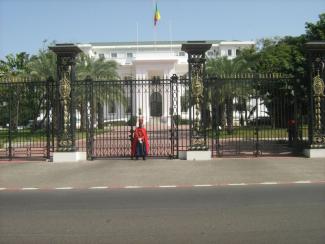Colonial history
The dark side of European enlightenment

Mbembe has an “Afropolitan” vision of his continent’s future. The way Mbembe uses the term, Afropolitan means that human rights are to be respected and that everyone must have the opportunity to make a difference in public life. The scholar also rejects rhetoric of victimhood. He does not paint a romantic picture of Africa, but sees many shortcomings, including poverty, violence, exploitation et cetera. Multi-ethnic and multi-cultural South Africa, where he now lives, is the country that comes closest to the Afropolitan vision, whilst wartorn failing states are the farthest from it.
Mbembe’s book “Sortir de la grande nuit – essai sur l’Afrique décolonisée” (Escaping the long night – essay on decolonised Africa) was originally published in French. The German edition was only launched last year. There is no English version so far.
Mbembe emphasises that African history is intertwined with the history of other continents, so diaspora communities matter. Migration from Africa (forced in the past and voluntary in more recent times) as well as migration to Africa (especially during the colonial conquests) have left their marks on all countries concerned. The experience of racism is shared by all. Mbembe insists that the idea must yet take root that every African person is entitled to a self-determined, assertive life on an equal footing with any other person on earth. In this regard, European enlightenment is an unfulfilled promise, not a historical achievement.
Double standards were typical of the colonial powers. While European thinkers developed the philosophy of enlightenment, their countries were involved in the slave trade and built oppressive empires, denying subjects with darker skin colours rights and opportunities. The imperial powers fostered racism as they claimed to spread civilisation.
A striking example of such double standards was Thomas Jefferson, the main author of the USA’s Declaration of Independence. The document states: “We hold these truths to be self-evident, that all men are created equal, that they are endowed by their creator with certain unalienable rights, that among these are Life, Liberty, and the Pursuit of Happiness…” Jefferson was a slave owner, and the USA only abolished slavery a century later after a bloody civil war. Racism still haunts the USA.
European powers’ approach to race was equally oppressive, Mbembe argues. The way western powers treated black people never fit their enlightened rhetoric.
Mbembe’s writing is forceful. The reasoning is interesting, but some metaphors are a bit ambiguous. The book lacks tangible policy proposals.
Mbembe certainly deserves European attention nonetheless. We Europeans are often unaware of our rhetoric concerning good governance and human rights ringing hollow in African or Asian ears. We tend to believe that racism and colonialism are things of the past in our cosmopolitan era. When Europeans discuss human rights with Africans they normally think of the freedoms of expression, assembly and association, not noticing that Africans are thinking of refugees drowning in the Mediterranean Sea. In this depressing context, it is reassuring that Mbembe points out that he is not anti-European, but simply wants Europe to live up to its own principles.
To some extent, however, he seems to be overly obsessed with Europe. The German version of the book has 300 pages, and 100 of them deal with France. One third of the book is thus not an essay on decolonised Africa, as the book’s subtitle promises, but one on post-colonial France. Yes, European and African history are linked and must be seen in context. However, focusing on European failure probably will not do much in terms of driving Afropolitan success. As Mbembe himself points out, it is ultimately up to Africa to solve African problems, and Europe’s influence is decreasing.
Hans Dembowski
Reference
Mbembe, A., 2016: Ausgang aus der langen Nacht – Versuch über ein entkolonialisiertes Afrika. (Escaping the long night – essay on decolonised Africa). Berlin: Suhrkamp. No English version available so far.
French original: 2010: Sortir de la grande nuit – essai sur l’Afrique décolonisée. Paris: La Découverte.








